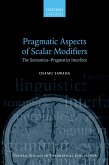Representing what someone else has said is an integral part of spoken and written communication. Speech representation occurs in many contexts from news reports and legal trials to everyday conversation. Although commonplace, it requires sophisticated choices regarding what to represent and how to represent it. These choices can highlight a speaker's voice, shape our perception of the reported speech, or support our claims of authority.While speech representation in Present-day English has been studied extensively, this book extends the discussion to historical periods.
Speech Representation in the History of English explores speech representation of the past, providing in-depth analyses of how speakers and writers mark, structure, and discuss a previous speech event or fictional speech. Focusing on the Early Modern English and the Late Modern English periods (1500-1900), this volume covers topics such as parentheses as markers of represented speech, the development of like as a reporting expression, the gradual formation of free indirect speech reporting, and the interpersonal functions of represented speech. Chapters draw on a wide range of methodologies, including historical sociolinguistics, pragmatics, and corpus linguistics, and cover many genres from witness depositions, literary texts, and letters, to the spoken language of the recent past. In this comprehensive volume, Peter Grund and Terry Walker bring together a collection of works that use cutting-edge approaches to speech representation. Researchers and students of the history of English, sociolinguistics, and discourse studies alike will find
Speech Representation in the History of English to be an invaluable addition to the field.
Dieser Download kann aus rechtlichen Gründen nur mit Rechnungsadresse in A, B, BG, CY, CZ, D, DK, EW, E, FIN, F, GR, HR, H, IRL, I, LT, L, LR, M, NL, PL, P, R, S, SLO, SK ausgeliefert werden.









